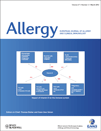Negative predictive value of skin tests to neuromuscular blocking agents
Edited by: Werner Aberer
Abstract
To cite this article: Ramirez LF, Pereira A, Chiriac AM, Bonnet-Boyer M-C, Demoly P. Negative predictive value of skin tests to neuromuscular blocking agents. Allergy 2012; 67: 439–441.
Allergy to neuromuscular blocking agents (NMBAs) is the most important caue of perioperative anaphylaxis in France. The diagnosis relies on a careful clinical history, the search of serum IgE antibodies, and the realization of skin tests. Although the skin tests are the most important tool and their sensitivity is widely recognized, the lack of information about their negative predictive value represents an important issue in the management of patients who require a new procedure with NMBA injection. We present a series of 49 patients with confirmed allergy to NMBAs, six of whom required a subsequent surgery with neuromuscular blockade. Negative skin tests allowed the selection of an alternative NMBA, which was well tolerated in all 6 cases. We found an excellent negative predictive value of skin tests in our series but larger studies are required to properly address this question.




